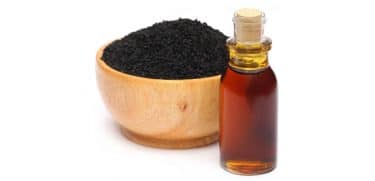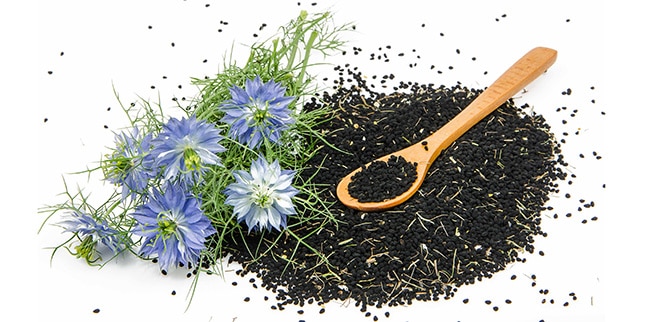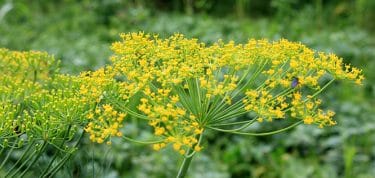Black seed (black cumin seed) has been one of the most valuable plants for medicine and herbalists throughout the history. This herb, which is good for many health issues, still maintains its reputation and continues to be one of the most used plants for scientific studies. It is possible to get benefit from both the seed and oil of black seed. It has medicinal effects and is a flavorer. Historical records show that black seed, which is even found in King Tutankhamun’s tomb, was used by Cleopatra for beauty and by Hippocrates for liver diseases. ‘Thymoquinene’ is the active substance of black seed and it is known for its anticarcinogenic effects and many studies have been conducted about it. There are many diseases for which black seed is recuperative such as diabetes, psoriasis and eczema, mycosis, allergies, Alzheimer, and digestive problems.
Table of Contents
What is black seed?
Black seed, also known as Nigella Sativa in medicine, is an herb commonly used all around the world. Black cumin, which has a wide area of use throughout history, is highly effective for the treatment of many diseases with both its seeds and oil. There is much knowledge in Ancient Egypt, Greece and even in Islamic literature with regards to the recuperative effects of it.
The black granules, which are used as spice, are the seeds of the herb. It is very effective for the treatment of hypertension, liver and kidney diseases, some types of cancers, obesity, and skin diseases. The herb is also used in pharmaceutical production.
Nutrients and vitamins inside black seed
There are three main natural chemicals that explain why black cumin seeds and oil have many benefits for the body. These are thymoquinene (TQ), thymohydroquinone (THQ) and timol. Black cumin seeds contain lipids, carbohydrates, albumin and more than one hundred of other nutrients that are yet to be fully determined.
It also contains unsaturated fatty acids, which are very important. These are linolenic acid, alpha linolenic acid, adipose and similar lipids. It has ether-containing lipids of Crude fat, Nigellon and alpha-pinene. And there are small amounts of vitamins B1, B2 and B6, Folasidi Niacin, iron, calcium, magnesium, zinc, selenium and amino acids.
Benefits of black seed
Black seed and cancer
Studies proved that black cumin is effective against blood, lung, kidney, liver, breast, cervical, skin and prostate cancers with its thymoquinone content. Although molecular mechanisms underlying its anti-cancer role, some studies showed that thymoquinone acts as an anti-oxidant, improves the immune system and leads to apoptosis (programmed cell death).
Today, there are many scientific studies ongoing about the use of black cumin content against cancer.

Studies suggest that the anti-tumor effects of thymoquinone inside black cumin seeds are effective in colon, prostate, pancreas and lung cancers. The use of thymoquinone in combination with chemotherapy drugs decreases the toxicity of the drugs.
Black seed in allergy treatment
Many studies support the use of black cumin seed for the treatment of allergic rhinitis. A study showed that it can alleviate the most common allergic rhinitis symptoms. It is good for allergic reactions like congestion, nasal flow, sneezing and swollen nasal canals. In addition, daily oral black cumin seed intake together with vitamin E, β-carotene and biotin reduces allergic reactions.
Benefits of black seed on Alzheimer’s disease
Scientific studies show that black seed is promising for the treatment of Alzheimer’s disease. In a study published in Journal of Ethnopharmacology, black cumin was determined to improve memory, attention and condition.
Treatment of asthma, bronchitis and epilepsy
Oral intake of black cumin extract improves lung functions, and reduces wheezing and coughing attacks in asthma patients. It also removes excretion and widens the trachea. 2 grams of ground black cumin should be used for 12 weeks. There is information stating that black cumin extract can decrease epilepsy attack however there is no scientific evidence in that regard.
High cholesterol treatment and black seed
There is evidence that daily intake of fully ground 1 gr. black cumin seed can reduce bad cholesterol and blood lipid levels in people with high cholesterol.
Benefits of black seed on hypertension
Using 0.5-2 gr. ground black seed or having extract twice a day for up to 12 weeks has important benefits on the regulation of blood pressure in people with hypertension. However, you should consult your doctor before use.
Can diabetic patients use black seed?
It is one of the few materials on earth that helps preventing both type 1 and type 2 diabetes. According to a study, it improves glucose tolerance as effectively as metformin and has very low toxicity. This is very important as metformin, one of the most commonly prescribed type 2 diabetes medication, has many side effects. Using 1 gram of ground black seed twice a day for 12 months increases blood sugar control by lowering the blood sugar concentration and increases insulin sensitivity in type 2 diabetes patients.
Other health benefits of black seed
- Good for coughing.
- Improves digestion.
- Diuretic properties
- Flu treatment.
- Alleviates headache
- Good for rheumatic diseases.
- Alleviates menstrual discomfort
- Accelerates wound healing and cell regeneration
- Black cumin extract reduced the symptoms related to opioid addiction and it is also good for throat pain and swollen tonsils.
Benefits of black seed oil
Is black seed oil good for liver?
Liver is one of the most important organs in the body. Almost all toxins are processed in the liver and the bile juice in the liver is the key for the digestion of fats and to maintain a healthy and happy mind and body. Black cumin oil can significantly accelerate the recovery process for people with liver dysfunction due to drug side effects, alcohol use or liver disease.
A recent scientific study showed that black cumin oil has positive contribution on healthy liver functions and helps preventing liver damage.
Does black seed oil help with weight loss?
Journal of Diabetes and Metabolic Disorders conducted a systematic literature review for plants with anti-obesity properties and found that black cumin oil is one of the most effective natural medicine on the planet. Black seed, traditionally believed not to treat obesity, is an amazing anti-inflammatory agent that helps diabetes patients and their weight loss.
It especially reduces the weight gain triggers like appetite, glucose absorption, liver gluconeogenesis, cholesterol and triglyceride and has helped many people to lose weight.
Can black seed oil cure infections?
It can kill antibiotic resistant bacteria. Methicilin Resistant Staphylococcus Aureus (MRSA) is one of the most important of them. MRSA is a major problem for hospitals and nursing homes around the world. Elderly population is especially at high risk as MRSA is generally related to surgeries, intravenous tubes, artificial joints and other invasive procedures.
MRSA have become a global public health risk with the increased elderly population and in relation to weakened immune system. Scientists from Pakistan obtained several MRSA strains and discovered that each one of them was sensitive against black cumin oil and that oil controlled and stopped the bacterial growth.
Black seed oil and high blood pressure
Regular use of black cumin extract for two months reduces high blood pressure. Oral intake of black cumin oil can help reducing the symptoms of inflammatory rheumatoid arthritis.
Black seed oil and asthma
Anti-inflammatory effects of black cumin oil help the alleviation of asthma symptoms. It removes bronchitis symptoms by reducing the inflammation in the respiratory tract.15 mL/kg black seed extract can be used daily for 3 months.
Stomach problems
Eating black seed can reduce stomach pain and cramps. Black cumin oil can help reducing gas problems, stomach bloating and ulcer pain.
Effects of black seeds on male infertility
Studies suggest that black cumin oil intake can increase sperm and sperm motility in men with infertility problems. 2.5 mL of it can be used twice a day for 2 months.
Breast pain (mastalgia)
Studies showed that applying a gel containing black cumin oil to breasts can reduce pain in women with breast pain during menstruation cycle.
Benefits of black cumin seed oil on the skin
Fatty acids and anti-oxidants inside black seed can have many different benefits on skin health. Black cumin oil moisturizes the skin, alleviates bacterial infections, prevents environmental stress, stimulates the production of new and healthy cells, improves the appearance of wrinkles and spots and forms a protective shield around the skin.
Black cumin oil application is also showed to decrease the frequency of psoriasis plaques in psoriasis patients. It is added to oils and moisturizers in order to improve the color and the moisture of the skin. Black cumin seed oil is observed to accelerate wound healing when applied to the affected area and prevent inflammation by reducing bacteria. It also contributes to the rejuvenation of skin.
https://www.healthandmedicine.net/what-is-psoriasis-symptoms-causes-and-treatment/
Benefits of black cumin on acne
According to the Journal of Dermatology and Dermatologic Surgery, the application of a lotion prepared with 10% black cumin content has significantly reduced acne incidence two months later. 67% of the study participants reported satisfaction.
Black seed oil is good for hair loss
Regular use of black cumin seed oil softens hair and increases its brightness. It also prevents hair loss.
How to make black seed oil?
You can easily obtain black cumin oil from herbalists. However, making your own oil at home will be much healthier and safer. Put 2 tablespoons of ground black seed into a 200 mL syrup bottle. The interior of the bottle must be completely dry.
You should prefer to grind black cumin seed by yourself using a small food processor or garlic press because you cannot benefit from black cumin that has been waiting after being grinded and contacted with air. Fill the bottle with olive oil and close the lid.
The bottle will wait for 1 week. Shake the bottle several times a day. You can use the oil after 1 week. Stop shaking 1 day prior to use because the residue must settle at the bottom of the bottle for a healthier result.
How to use black seed oil?
Today, there is no definite daily allowance limits for black seed in terms of a healthy life. Combining unprocessed seeds with meals and skin care products is the safest way to use black cumin seed oil. If you are using a packaged product, you should follow the recommended daily dose. The daily intake is generally 1-2 teaspoons. You should talk to your doctor before using black cumin oil.
Side effects of black seed
If you are using regular medication, you should consult your doctor before taking black cumin oil or capsule.
Liver and kidney
Black cumin can be helpful for liver functions but it may also damage kidneys and liver in case of excessive consumption. If you have any problems with either of these organs, you should consult your doctor to determine a safe dose.
Contact dermatitis
One of the potential side effects of black cumin is contact dermatitis. Touching black cumin can cause red skin rash. And it generally causes itchiness.
Hypotension
Memorial Sloan-Kettering Cancer Center specifically highlights that black cumin can lower the blood pressure down to hypotension level especially if used together with diuretic or antihypertensive medication. Decreased blood pressure prevents oxygen supply to brain, heart and other organs. And this can result in fatigue, nausea, hyperventilation, dizziness and loss of consciousness.
Can pregnant women use black cumin?
Black cumin is highly dangerous during pregnancy. It can increase premature birth or miscarriage risk by causing contraction in smooth muscles of the uterus.
Allergic Reactions
Herbal treatments always have allergy risk. Different from contact dermatitis, some allergic reactions are not related to the skin. Other allergic reactions can cause swelling in the lips, tongue, throat or face and lead to difficulty in breathing, tingling in the mouth, dizziness, nausea, vomiting, diarrhea and stomach cramps. For more: >>> Black seed




